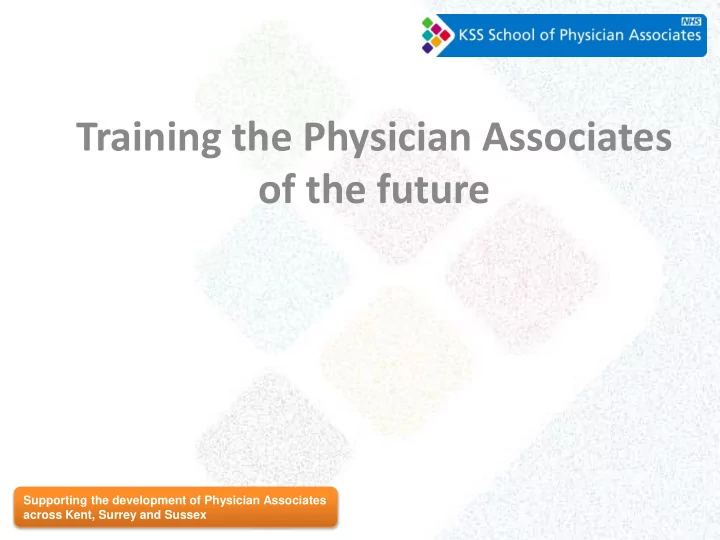

Training the Physician Associates of the future Supporting the development of Physician Associates across Kent, Surrey and Sussex
What is a Physician Associate? A PA is a healthcare professional who is trained to the medical model and who works as part of a medical team to provide holistic medical care Supporting the development of Physician Associates across Kent, Surrey and Sussex
How the PA profession has developed 2006 2015 DoH publish 2016 Ongoing… 1961 2005 2012 2013 RCP launch Competenc 270 in UK push for First UKAPA DoH revise Name FPA to e and Regulation proposed in 110,000 in formed CCF change replace Curriculum the USA USA GMC/HCPC UKAPA Framework (CCF) Supporting the development of Physician Associates across Kent, Surrey and Sussex
What can PAs do? Take a focussed history Examine a patient Undertake/request appropriate diagnostic tests and investigations All with physician Interpret tests and investigations supervision Formulate differential diagnoses Refer to other teams as required Suggest medications Compile a treatment and management plan Supporting the development of Physician Associates across Kent, Surrey and Sussex
Training includes: Prescribe (pharmacology and therapeutics) IM/IV/O2 Therapy Request ionising radiation unable to do until Regulation Supporting the development of Physician Associates across Kent, Surrey and Sussex
Where do PAs work? Adult Medical General Surgical Cardiology Educators Care of the Elderly Dermatology Emergency Medicine Breast Surgery Endocrinology Colorectal Surgery General Practice Gastroenterology Neurosurgery Acute medical/clinical General Internal Medicine Orthopaedic Surgery decision units Sexual Health Otolaryngology Haematology Spinal Surgery Infectious Diseases Trauma and Orthopaedics Paediatrics Lymphoedema Urology Critical Care Psychiatry Vascular Surgery General Paediatrics Rehabilitation Medicine Paediatric Surgery Respiratory Medicine Supporting the development of Physician Associates across Kent, Surrey and Sussex
How do PAs Train? PGDip/MSc Physician Associate Studies Entry requirements - at least 2:2 in science based BSc Masters level/intensive study 2 year full-time (45 weeks / year), MSc up to 3 years 1600+ hours – university based 1600+ hours – placement based in Hospital and GP Courses now available at universities all over the country…. Brighton and Sussex Medical School Birmingham Wolverhampton St George’s London Canterbury Christ Church University Worcester University of Surrey Leeds Liverpool Anglia Ruskin Reading Manchester Plymouth Sheffield Hallam Central Lancashire Aberdeen and Dublin Supporting the development of Physician Associates across Kent, Surrey and Sussex
PA Education and Training The Competence and Curriculum Framework (CCF) Standards of education and practice, including: • Core competencies • Procedural skills • Patient presentations • Clinical conditions Supporting the development of Physician Associates across Kent, Surrey and Sussex
Secondary Care Placement Rotations Specialty A&E/ED Acute Medicine General Surgery Paeds O&G General Medicine all/some of Geriatrics, Gastro, Cardio, Respiratory, Endo Mental Health at Partnership Trust Supporting the development of Physician Associates across Kent, Surrey and Sussex
Qualification & Registration National Exam Upon completion of university course 200 single best answer and 14 station OSCE Examined across range of specialities Recertification 6 yearly cycle 200 single best answer examination CPD 50 hours/year Supporting the development of Physician Associates across Kent, Surrey and Sussex
How does it work in practice? Supporting the development of Physician Associates across Kent, Surrey and Sussex
PAs working in Secondary Care Organisational/Leadership Clinical • Patient reviews • Induction of junior doctors • Family meetings • PA/Medical student teaching • Clerking • Morbidity & Mortality • Clinic • Audit • Theatre • Leadership projects • Clinical Procedures • bloods, cannulas, ABGs, pleural Departmental meetings tap, chest drain, LP, ascitic tap, ascitic drain • Safety leads • Culture champions Supporting the development of Physician Associates across Kent, Surrey and Sussex
What do PAs do at SASH? Geriatrics CGA assessments, OPALS assessments, ward rounds, cognitive assessments, on call Cardiology duties Emergency ETT’s, angio Orthogeriatrics Department sessions, ward duties, day case mx NOF# bleep carrier, ward reviews, Acute Medicine post op reviews, Each PA has sessions falls clinic in acute medicine Respiratory PE pathways, acute respiratory admissions, NIV round Supporting the development of Physician Associates across Kent, Surrey and Sussex
Employing PAs • Agenda for Change: Band 7 • Many take job in hospital where they trained • Consistency: 6-12 months in role before rotating • Map role to supervisors job plan • Consider a team of PAs – support and avoid isolation Supporting the development of Physician Associates across Kent, Surrey and Sussex
Retaining PAs • Currently need outstrips supply • Make role interesting and varied • Extended skills • PDP, study budget, study leave Value…. Nurture …. Develop…. Supporting the development of Physician Associates across Kent, Surrey and Sussex
Student Supervision Named consultant supervisor with experience of supervising students PA specific training/orientation Informal “start of placement” review Variety of assessment methods- encourage MDT completion End of placement review with named clinical supervisor Fitness to practice concerns relayed to HEI Supporting the development of Physician Associates across Kent, Surrey and Sussex
Student Expectations DOPS Active participation in ward round Help team with ward jobs Clerking “Interesting” patients Observe imaging, interventions Shadowing in clinic and advanced procedures Supporting the development of Physician Associates across Kent, Surrey and Sussex
Where can I get more information or support? • Course / Student specific : contact your local University Canterbury Christ Church/University of Kent – Sue Graham Brighton and Sussex Medical School – Wesley Scott-Smith University of Surrey – Sofia Khan General queries Kent Surrey and Sussex School of PAs based at East Surrey Hospital kss.schoolofpas@nhs.net kssschoolofpas.org Supporting the development of Physician Associates across Kent, Surrey and Sussex
Recommend
More recommend